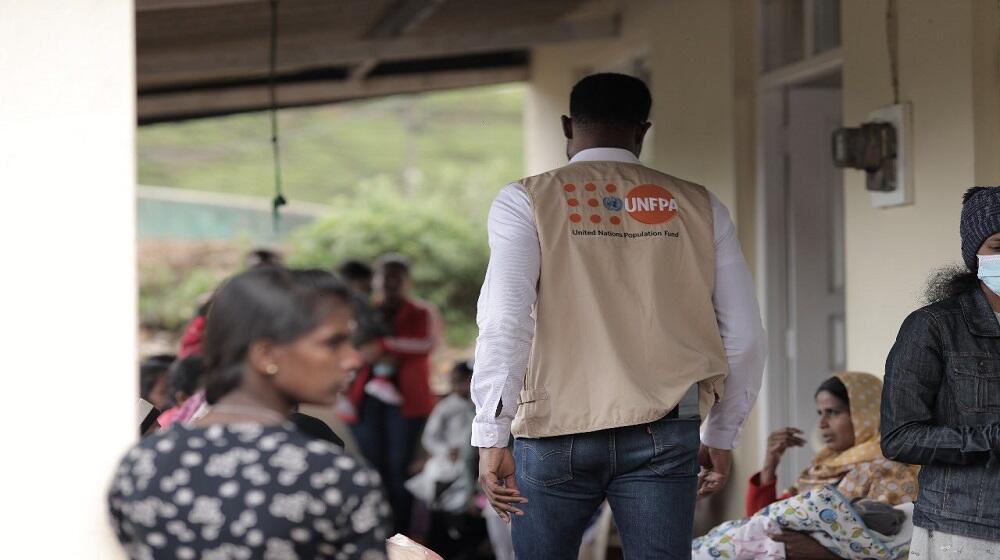As we started our journey to Nuwara Eliya in the Central Province, moving away from the hustle and bustle of Colombo, the landscape changed to a lush green and cool climate, marking a refreshing change.
UNFPA Sri Lanka had previously run an emergency response in a nearby area, Nawalapitiya, when a natural disaster struck, responding to the growing needs of women, girls and families in the area.
Our journey this time was different. I was preparing to meet officials and communities who were part of our programmes. I was amazed at how welcoming the communities were and willing to embrace my team and myself despite all the hardships and challenges they face.
Our stellar partner on the ground, Family Planning Association of Sri Lanka (FPASL), led us through the hospital facilities and awareness sessions that were conducted with Australia Department of Foreign Affairs and Trade (DFAT) support in Nuwara Eliya. The team was keen to understand the status of maternal and child health, sexual and reproductive health services and gender-based violence services available at the District General Hospital. UNFPA supports comprehensive, survivor-centered responses in humanitarian and development settings through quality health, social and justice services.
Our discussions led us to explore the possibility of future collaborations, especially to strengthen providing primary healthcare services. Making motherhood safer is at the core of UNFPA’s mandate. We work with governments, health experts and civil society to train health workers, improve the availability of essential medicines and reproductive health services, strengthen health systems, and promote international maternal health standards.
The way the community responded to FPASL, it was very evident the officers were beloved for going above and beyond their jobs to ensure every member in the communities felt seen, heard and cared.
Hospitals are facing a growing need for support for medicine and commodities to accommodate patients. UNFPA-supported programmes emphasize capacity development in maternal care, especially the strengthening of human resources, emergency obstetric and newborn care and respectful and human-centered quality care. As the discussions with the hospital officials continued, FPASL stepped in to carry on its support to the community and UNFPA where their expertise was needed.
A hotline to support survivors of violence, the Mithuru Piyasa service, noted an increase in the cases it receives following its re-establishment in 2022, especially as it commenced operations in the two main languages, Sinhala and Tamil. As health services are among the first places survivors of gender-based violence seek assistance, UNFPA leverages this critical opportunity to reach affected women and girls.
I visited a maternity clinic conducted in the Kandapola area, which provided me an opportunity to ask the communities themselves how the services were and what their needs were. It was amazing to see mothers with their children, supported by fathers and other family members, receive medical support and care at the hands of experts. UNFPA helps to train midwives, supports emergency obstetric and newborn care facilities and networks, and provides essential drugs and family planning services.
My conversations with doctors and midwives serving the surrounding communities provided much needed insight into the challenges and obstacles they face, but also how they support one another to ensure that no woman, girl or child is left behind in receiving care and support.
Following the visit to Nuwara Eliya, we journeyed to Batticaloa, a city in the Eastern Province. The change from the cold to warm climate provided a slight relief.
As we dove into meetings, my discussions with officials on the status of sexual and reproductive health, maternal and child health, gender-based violence prevention and mental health services provided at the grassroot level, allowed us to discuss potential for future collaboration to ensure that communities continue to receive much needed medical services and support.
My observations also indicated the urgent need to support the school and community based mental and adolescent health outreach and training programmes to address the increasing trend of teenage pregnancies and suicides.
The FPASL mobile clinic in Batticaloa provided me a chance to really get to know the field staff. A commonality of the field staff across the provinces was their commitment and dedication to the communities they serve tirelessly and with all their heart. They never hesitate to help, provide a kind word or beautiful smile to the people.
Prior to departing back to the city, we visited the Cash Voucher Assistance (CVA) programme conducted by our partner Save the Children International (SCISL) supported by the Government of Japan. At the cash distribution point, we were able to see how the cash distributions were useful to the women and their families. My conversations with beneficiaries provided insight into how the cash was useful for their health and wellbeing needs and helped families combat the rising inflation.
As we headed back to the hustle and bustle of the city, I was in awe of the magnitude of what I had experienced - the warm embrace of communities despite their hardships, the magnanimity of field health staff who are delivering a commendable service, despite logistical, human resource and infrastructure constraints, to ensure that no one is left behind.
UNFPA is on the ground before, during and after crises, engaging closely with governments, local organizations, UN agencies and other partners to ensure that sexual reproductive health and rights and responses to gender-based violence are integrated into our response.


